House With Unique Pivoting Door



House With Unique Pivoting Door
Architects- Diego Guayasamin Arquitectos Location- Quito, Ecuador Images- Sebastián Crespo Source- contemporist
*for design inspiration, follow @designismymuse
More Posts from Stubborn-turtle-blog and Others
I want to see an adventure story set in medieval Bologna
Or Assassin's Creed



The city of Bologna in the 12th-13th century - the closest we can get to a medieval skyscraper city; because nobles used to build high towers as a symbol of power and also for offensive/defensive purposes, at one point there were around 100 such towers.
Keep reading
Something a little more frivolous
I have been all of these at one point or another.
Science Aesthetics
I was feeling inspired last night, so I decided to make this purely for fun.
To the moon and back: Cold, dark nights clutching thermos flasks of hot coffee. Machinery whirring as telescopes trace a star across the sky. Intricate, geometric drawings of the celestial sphere. A messy bun and a NASA t-shirt. Filling in the logbook while punk rock blares in the background to keep you energised and awake. Pictures of nebulae and galaxies everywhere, because pretty space pictures is half the fun. Annoyed huffs every time someone mentions their star sign.
Natural Philosopher: Long, intellectual debates in coffee shops about mathematics, physics, philosophy. Chalkboards covered with equations and calculations in a precise, curving handwriting. That Eureka moment while deep in thought, expressed only with a small smile and a scribbled proof on the back of a serviette. Chaotic desks in front of bookshelves groaning with old textbooks. Antique lab equipment as functional decor.
“Trust Me, I’m a Scientist”: Large computer screens running freshly-typed code. Neat lab books and PDFs of journal articles. The smell of whiteboard markers. Polished new equipment in a tangle of cables, hooked up to a digital oscilloscope. Exact amounts of chemicals in rows in metal shelves. Resting your feet up on the bench after a long day in the lab. The satisfying hum of your colleagues as they work on their experiments around you.
Science Expedition: Dirt under your nails and a loosely-bound collection of field notes. Plant clippings carefully taken to be analysed back in the lab. Soft fur on tough, wild animals. The bitter smoke from eco-friendly firewood while you roast marshmallows and listen to a supervisor’s witty stories. Free-handing diagrams while looking through a microscope. Sketching flowers and that gorgeous ocean view from your last field trip. Reading Darwin on the bus home but falling asleep on your lab partner’s shoulder out of sheer exhaustion after the first three pages.
Life is a Science: Scrolling past an anti-vax facebook post and resisting the urge to burn down the internet. Shiny dissection kits and the sharp smell of formaldehyde. Making time to work out and pack a healthy lunch because your mind is sharpest when your body is well. Debunking the latest superfood fad with peer-reviewed journal articles. Making friends with some of the nicer med school kids in anatomy class. Colour-coded, neatly labelled diagrams and a thousand different terms memorised. Getting a double-helix DNA sculpture for your desk.
What they show on TV isn’t real hacking: Rubbing your eyes after staring at a screen for five hours straight. Having a blank keyboard because all the letters are rubbed off already. Energy drinks in strange colours at strange hours. Being fluent in four different coding languages. Circuit boards and printouts. Ones and zeroes. Running jokes about turning everything off and on again. Rage-quitting when you realise you forgot a comma or a colon somewhere. Black screens with brightly coloured lines. The comforting click-click of fingertips tapping keys. Applying to intern at Google every three months because maybe they’ll take you this time. Writing a piece of code to do something simple just because.

This awesome plane-train hybrid could revolutionize transportation, but not for another 50 years
Imagine a future where a plane lands at an airfield that doubles as a rail yard. The cabin — one of three that cling to the underbelly of the aircraft like a baby possum to its mother — detaches, is seamlessly transferred to a nearby train, and then continues its journey toward the city center. Your multi-seat trip (taxi-to-subway-to-airtrain) from home to hotel suddenly becomes a one-seat, hassle-free ride. That’s the aim of a consortium of Swiss researchers with the conceptual Clip-Air, a bold-looking plane-train hybrid that despite its high-minded possibilities, will probably never get made.
Dolce Far Niente in Dance Sport - Dance Comp Review
New Post has been published on http://dancecompreview.com/dolce-far-niente-dance-sport/
Dolce Far Niente in Dance Sport
It wasn’t that long ago, when I set up a new training schedule for my partner and I: a plan with all the goals, the training sessions and the topics we wanted to improve. To be honest, I was proud of what I created, because it was so thought through along with a lot of things finally falling into place. Well, at least these were my thoughts – until I brought the plan for discussion to a private lesson with our coach…
I am so glad that I had a professional eye to look over this! When he saw the schedule, he nodded and then said: “Good work so far, but there is one crucial thing missing.” It was like a wakeup call when he told me: “I see everything in this plan, except for the time when you do nothing at all”. That was it! I totally forgot to plan the time for regeneration: one of the key components when it comes to successful training.
In a (dance)-society that is (mostly) driven by the words higher, faster, stronger, we all tend to forget that we only get better in the time we leave our bodies to regenerate. This doesn’t mean of course that we will get better by doing nothing at all. It’s all about doing nothing AFTER we have been working hard. For instance, if we want to make our muscles more powerful, they first have to be exhausted and then they need time to rebuild to an even stronger version. But also our brain needs downtime to process new information. If we learn something new, it’s first saved in the short-term memory and then by processing the information, it will probably be stored in the long-term memory. And as we all know, in sleep our brain consolidates memories best.
Active work demands for active recovery from the physical and mental demands, in order to improve what we are doing. This goes for nearly all aspects in life and also perfectly for dancing. What do I mean by “active recovery”? Here is a quick and personal list:
Giphy
Low Impact Activities
It’s always great to go on a short, easy 15-minute-walk. You can also do a really low impact Yoga session or stretch a little bit. Everything that makes you feel calm, relaxed and refueled. But don’t overdo it! Really give your body a rest!
Giphy
Nutrition
Of course and as always, what you put into your body is crucial. A balanced nutrition is key to your healthy body as well as active recovery. Try to really control the amounts and also the quality of food you are taking in, and your exhausted muscles will thank you. Not to mention, your concentration on the next lesson will be so much better. One really important tip to keep in mind is, that starving your body (in case you are trying to lose weight or you’ve been telling yourself that “you don’t have time to eat”) is not good for your recovery at all. It will stress your system even more and will not let your body improve.
Giphy
Sleep
According to the National Sleep Foundation, Serena Williams, a really successful tennis player, enjoys to go to bed at 7pm in order to get enough sleep. I am not telling you, that this would also work for you, but it is worth giving a thought. I used her example to really emphasize on how important sleeping is, even more for people who are physically active. It doesn’t matter if you consider yourself as a serious athlete/artist, or if you are just in it for fun, but getting the right amount of sleep is decisive to your performance and also to your improvement. Adults between the age 18 and 64 need between 6 and 11 hours, while 7-9 hours of sleep are recommended. I understand that this is a lot of time, but, in my opinion, sleeping is not enough of a priority anymore. Find yourself a sleeping schedule and also keep it on the weekends. Turn off electronics, find your ideal light, sound and temperatures in your bedroom and give your system a chance to reboot.
Giphy
Let go of the “Coulda Woulda Shoulda”
If you now come to the conclusion that some downtime for yourself is what you need, you also have to let go of all the Rumba Walks you could have practiced in that time. Really! Focus on relaxing, recovering and refueling your energy! And, stop overthinking all the things you could’ve, should’ve or would’ve been able to do then. Just enjoy the famous Dolce Far Niente. And, afterwards – Dance on, even better than before!
Author: Sophia Wedel Photography: Maggiore Fotografico Exclusively for Dance Comp Review
Mission Possible: Redirecting an Asteroid
As part of our Asteroid Redirect Mission (ARM), we plan to send a robotic spacecraft to an asteroid tens of millions of miles away from Earth, capture a multi-ton boulder and bring it to an orbit near the moon for future crew exploration.
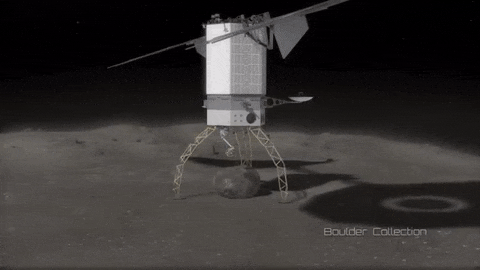
This mission to visit a large near-Earth asteroid is part of our plan to advance the new technologies and spaceflight experience needed for a human mission to the Martian system in the 2030s.
How exactly will it work?
The robotic spacecraft, powered by the most advanced solar electric propulsion system, will travel for about 18 months to the target asteroid.

After the spacecraft arrives and the multi-ton boulder is collected from the surface, the spacecraft will hover near the asteroid to create a gravitational attraction that will slightly change the asteroid’s trajectory.

After the enhanced gravity tractor demonstration is compete, the robotic vehicle will deliver the boulder into a stable orbit near the moon. During the transit, the boulder will be further imaged and studied by the spacecraft.

Astronauts aboard the Orion spacecraft will launch on the Space Launch System rocket to explore the returned boulder.

Orion will dock with the robotic vehicle that still has the boulder in its grasp.

While docked, two crew members on spacewalks will explore the boulder and collect samples to bring back to Earth for further study.

The astronauts and collected samples will return to Earth in the Orion spacecraft.
How will ARM help us send humans to Mars in the 2030s?

This mission will demonstrate future Mars-level exploration missions closer to home and will fly a mission with technologies and real life operational constraints that we’ll encounter on the way to the Red Planet. A few of the capabilities it will help us test include:
Solar Electric Propulsion – Using advanced Solar Electric Propulsion (SEP) technologies is an important part of future missions to send larger payloads into deep space and to the Mars system. Unlike chemical propulsion, which uses combustion and a nozzle to generate thrust, SEP uses electricity from solar arrays to create electromagnetic fields to accelerate and expel charged atoms (ions) to create a very low thrust with a very efficient use of propellant.
Trajectory and Navigation – When we move the massive asteroid boulder using low-thrust propulsion and leveraging the gravity fields of Earth and the moon, we’ll validate critical technologies for the future Mars missions.
Advances in Spacesuits – Spacesuits designed to operate in deep space and for the Mars surface will require upgrades to the portable life support system (PLSS). We are working on advanced PLSS that will protect astronauts on Mars or in deep space by improving carbon dioxide removal, humidity control and oxygen regulation. We are also improving mobility by evaluating advances in gloves to improve thermal capacity and dexterity.
Sample Collection and Containment Techniques – This experience will help us prepare to return samples from Mars through the development of new techniques for safe sample collection and containment. These techniques will ensure that humans do not contaminate the samples with microbes from Earth, while protecting our planet from any potential hazards in the samples that are returned.
Rendezvous and Docking Capabilities – Future human missions to Mars will require new capabilities to rendezvous and dock spacecraft in deep space. We will advance the current system we’ve developed with the international partners aboard the International Space Station.
Moving from spaceflight a couple hundred miles off Earth to the proving ground environment (40,000 miles beyond the moon) will allow us to start accumulating experience farther than humans have ever traveled in space.
Make sure to follow us on Tumblr for your regular dose of space: http://nasa.tumblr.com
Phone becomes your weapon if spells aren’t equipped

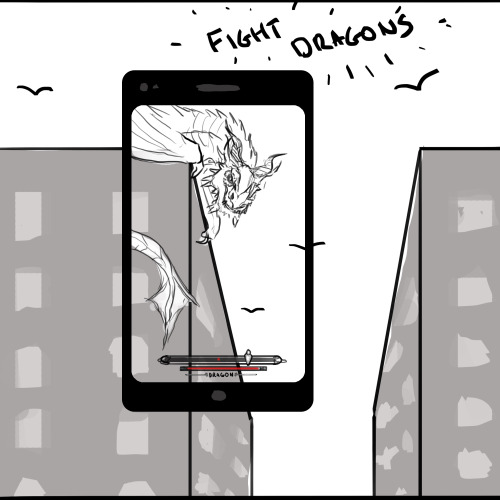
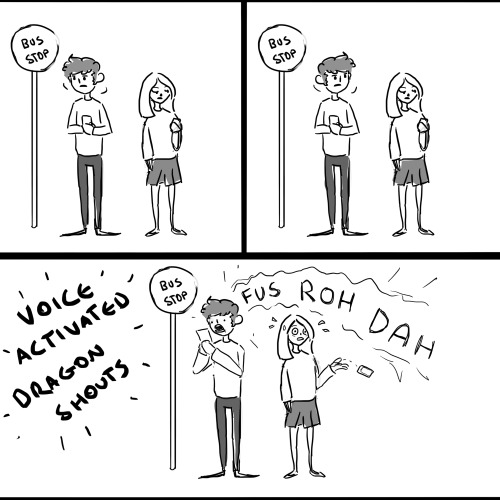
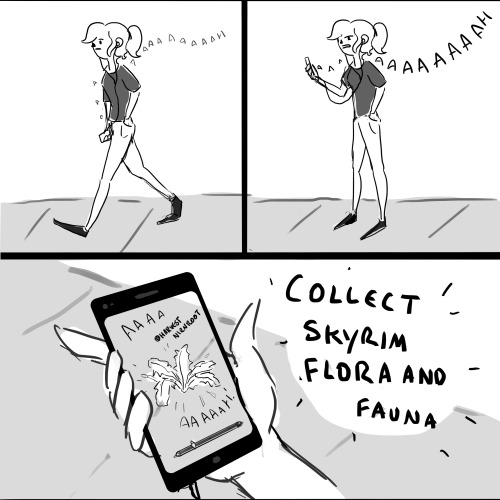
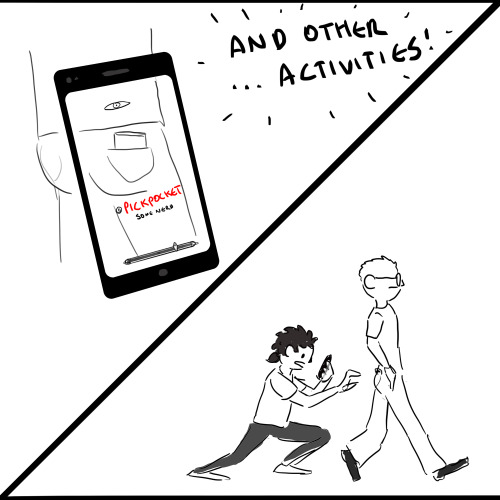
no cheese shop would be safe
Does anyone else just examine the marvel that is the human body (not in a sexual way). Like, I’m sitting here right now moving my fingers and watching my ligaments tense and loosen as they pull on the bones that compose the phalanges of my hand. Certain finger positions cause divots to form between the ligaments, while balling a fist causes them to be almost even with the flesh of my hand.
Sorry for the weird ramble. I just find how all the parts of the human body work and fit together to be absolutely fascinating.
The human body is an amazing machine.
![Yikes! [http://imgur.com/0mHJob3]](https://64.media.tumblr.com/64b1e17ce0a209744bc5d5590c95b597/tumblr_ohxss5q1c51s04h2ho1_500.jpg)
Yikes! [http://imgur.com/0mHJob3]




Elevated walkway and visitor centre added to 12th century abbey ruins by Binario Architectes »
-
 i-am-balthazar reblogged this · 3 years ago
i-am-balthazar reblogged this · 3 years ago -
 shiningstar1700 liked this · 5 years ago
shiningstar1700 liked this · 5 years ago -
 valkiriforce reblogged this · 5 years ago
valkiriforce reblogged this · 5 years ago -
 valkiriforce liked this · 5 years ago
valkiriforce liked this · 5 years ago -
 fvcking-dope liked this · 6 years ago
fvcking-dope liked this · 6 years ago -
 colenalle liked this · 6 years ago
colenalle liked this · 6 years ago -
 karafrench liked this · 6 years ago
karafrench liked this · 6 years ago -
 grandjohn4 liked this · 7 years ago
grandjohn4 liked this · 7 years ago -
 lansz liked this · 7 years ago
lansz liked this · 7 years ago -
 manolosaucedo-blog liked this · 7 years ago
manolosaucedo-blog liked this · 7 years ago -
 transientthoughtz reblogged this · 7 years ago
transientthoughtz reblogged this · 7 years ago -
 mr-geographic reblogged this · 7 years ago
mr-geographic reblogged this · 7 years ago -
 fiorenzano liked this · 7 years ago
fiorenzano liked this · 7 years ago -
 fiorenzano reblogged this · 7 years ago
fiorenzano reblogged this · 7 years ago -
 luissotoa00571262-blog reblogged this · 7 years ago
luissotoa00571262-blog reblogged this · 7 years ago -
 fashionmeals reblogged this · 7 years ago
fashionmeals reblogged this · 7 years ago -
 captainsorgoz liked this · 7 years ago
captainsorgoz liked this · 7 years ago -
 djaienti liked this · 7 years ago
djaienti liked this · 7 years ago -
 paulogarciag reblogged this · 7 years ago
paulogarciag reblogged this · 7 years ago -
 masmike liked this · 8 years ago
masmike liked this · 8 years ago -
 rainbowicecream-blog1 liked this · 8 years ago
rainbowicecream-blog1 liked this · 8 years ago -
 parisgivenchy9 liked this · 8 years ago
parisgivenchy9 liked this · 8 years ago -
 avadesigngroup liked this · 8 years ago
avadesigngroup liked this · 8 years ago -
 yavetorres liked this · 8 years ago
yavetorres liked this · 8 years ago -
 vanquishrs-blog liked this · 8 years ago
vanquishrs-blog liked this · 8 years ago -
 funandcake liked this · 8 years ago
funandcake liked this · 8 years ago -
 jardin-denou liked this · 8 years ago
jardin-denou liked this · 8 years ago -
 myuniquevision liked this · 8 years ago
myuniquevision liked this · 8 years ago -
 akasha-frequencies liked this · 8 years ago
akasha-frequencies liked this · 8 years ago -
 sup3rsven liked this · 8 years ago
sup3rsven liked this · 8 years ago -
 bdndhsjndfgg liked this · 8 years ago
bdndhsjndfgg liked this · 8 years ago -
 jerrypbeale-blog liked this · 8 years ago
jerrypbeale-blog liked this · 8 years ago -
 qingchenweilan2 liked this · 8 years ago
qingchenweilan2 liked this · 8 years ago -
 islandcandy83 liked this · 8 years ago
islandcandy83 liked this · 8 years ago -
 waterfront9fairy8 reblogged this · 8 years ago
waterfront9fairy8 reblogged this · 8 years ago -
 moderateelephants reblogged this · 8 years ago
moderateelephants reblogged this · 8 years ago -
 hazielm reblogged this · 8 years ago
hazielm reblogged this · 8 years ago -
 ipekbe liked this · 8 years ago
ipekbe liked this · 8 years ago -
 leogott liked this · 8 years ago
leogott liked this · 8 years ago
Gaming, Science, History, Feminism, and all other manners of geekery. Also a lot of dance
243 posts
